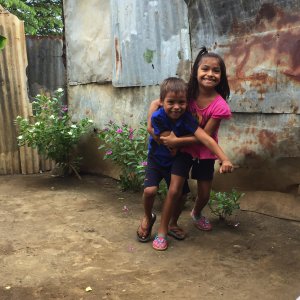 We started the day meeting and collaborating with our UPOLI students, as well as a videographer from the university. We then headed to the barrio to spend the morning with our families. As we continued assessing and educating our families, the videographer captured our work. This being the fourth day with our families, we allowed them to direct the conversations. This lead to highly personal discussions – with us learning more about one another outside of realm of health. It was an enlightening experience exchanging life stories with our families. We have felt so welcomed by them the entire time we have been here and are grateful they trusted us enough to open their homes to a group of strangers. David and Kylie educated their family on proper dental hygiene techniques – tooth brushing, rinsing, and flossing. After assessing one of the children in their family, they discovered that the child had been recently plagued by a gastrointestinal illness and has had a difficult time staying adequately hydrated. David and Kylie jumped into action, buying sugar, salt and a new water jug. They then taught the mother the recipe for oral rehydration solution and mixed it together in order to restore the child electrolyte and water balance.
We started the day meeting and collaborating with our UPOLI students, as well as a videographer from the university. We then headed to the barrio to spend the morning with our families. As we continued assessing and educating our families, the videographer captured our work. This being the fourth day with our families, we allowed them to direct the conversations. This lead to highly personal discussions – with us learning more about one another outside of realm of health. It was an enlightening experience exchanging life stories with our families. We have felt so welcomed by them the entire time we have been here and are grateful they trusted us enough to open their homes to a group of strangers. David and Kylie educated their family on proper dental hygiene techniques – tooth brushing, rinsing, and flossing. After assessing one of the children in their family, they discovered that the child had been recently plagued by a gastrointestinal illness and has had a difficult time staying adequately hydrated. David and Kylie jumped into action, buying sugar, salt and a new water jug. They then taught the mother the recipe for oral rehydration solution and mixed it together in order to restore the child electrolyte and water balance.
In the afternoon, we got to tour a public women’s hospital further showing us the various aspects of the Nicaraguan healthcare system and the vast differences from the United States. We toured different unites included the Emergency Department, NICU, Obstetrics and Gynecology, Oncology, and Postpartum. Nurse ratios here blew us away with a whopping 1:70 nurse to patient ratio in the obstetrics department. We also noticed a vast number of medical residents on staff compared to the number of medical doctors circulating. We were very impressed by the NICU and ED in terms of how advanced the equipment was, the standard of care, and the cleanliness inside. We want to give a quick shout out to Dr. Gordon and Dr. DJ: Kangaroo care and skin to skin is a huge priority in the nursing care at the hospital here, but unfortunately, their Cesarean-section rate is a staggering fifty-percent. One of the most shocking things in the Nicaraguan health care system, is the absence of HIPPA or patient privacy laws in regards to medical documentation. It is quite alarming to see patient privacy be such a low priority when it is so highly protected in the US.